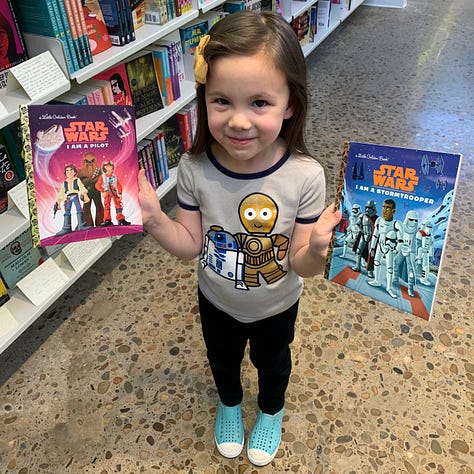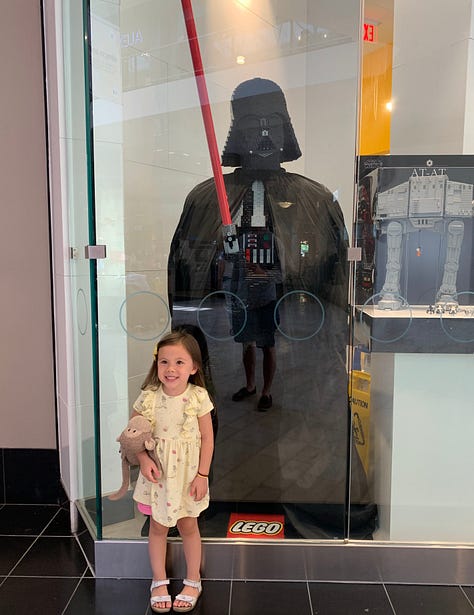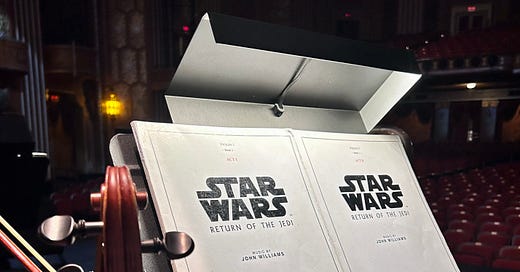The Musical Father Who Brought Star Wars to Life
A look at the family life and legendary film scores of John Williams
So, I have become a fairly big Star Wars fan in recent years. It happened while rewatching the classic movies and shows with my daughter, Hannah. As the iconic galaxy filled little Hannah’s eyes with wonder, the stories resonated with me in new ways as a father. We began reading Star Wars books, building Star Wars Lego sets, filling Star Wars coloring books, and re-enacting light saber battles. Hannah loved learning about the characters, and some of our earliest conversations about good and evil were inspired by her favorite bad guy, Darth Vader, and her favorite good guy, Anakin Skywalker.



In the same season, I got to play violin for concert productions of all three of the original Star Wars films, furthering my appreciation for the saga and its themes. The scores are true symphonic masterpieces, and I found that rehearsing and performing them gave me a greater window into the dedication and ideals of their composer. As someone who loves writing about the combination of music and family, I suspected that the power of Star Wars and its music to connect families across generations was coincidental. I looked into the family life of Star Wars composer John Williams and was not disappointed.
“The (Music) is Strong in My Family”
As J.S. Bach had centuries earlier, John Williams gained his love for music from his father. Johnny Sr. was a jazz percussionist who played on Hollywood film scores like Bernstein’s On the Waterfront. With the elder’s guidance, the younger learned how to navigate a life and career in music and was soon recording jazz albums himself and playing piano for films like To Kill a Mockingbird. John’s mother was a dancer, and his older sister Joan became a piano teacher. His little brothers, Donald and Jerry, became highly successful jazz drummers like their father and eventually played in John’s film scores.
When the time came for John to establish his own musical family, he married singer and actress Barbara Ruick, who starred in recordings and film adaptations of musicals by the Gershwins and Rodgers & Hammerstein. John and Barbara had three children together, and he spent countless hours writing music to provide for them. When the children were teenagers, Barbara tragically suffered an intracerebral hemorrhage and was found dead in her hotel room while filming away from home. John shared the difficult memory in a recent documentary on his music:
“It was an unbelievable event. A perfectly healthy, gorgeous young woman suddenly gone from an aneurysm that we couldn’t have predicted. That was a profound event in my life, obviously—my wife, but also the mother of my three children, and she was only 41 years old. I was suddenly in my early forties with three teenage children to deal with. It was a very tough situation. Sometimes very difficult to talk about.”1
I am reminded of the devastating news Bach once received upon his return from a trip. His beloved wife, also named Barbara, whom he had left in good health, had died while he was away, leaving him with four growing, grieving children. While we cannot interview Bach on this, he wrote his famous Chaconne for solo violin around the same time. Williams, meanwhile, wrote his Violin Concerto No. 1, remembering how his wife’s father had been a violinist and how she had always wanted him to write a violin piece for her. Reflecting further, John said:
“I felt like she was helping me. It was just a funny kind of feeling that I had. And I still have it. And I think in some way I grew up artistically or gained some kind of energy or penetrated what I was doing a little more deeply. The busiest, most successful period of my life in film started immediately thereafter, when I was asked to do a film called Star Wars.”
As John’s career exploded through the success of Star Wars, his sons also pursued musical careers. Mark became a drummer like his uncles and grandfather, performing with pop and rock stars like Tina Turner. Joseph became the lead singer for the band Toto in the ‘80s and sang the part of adult Simba in Disney’s 1994 Lion King. John’s firstborn, Jenny, is a psychotherapist and married composer and songwriter Jay Gruska, who has written various hit songs, along with the music for the show Lois and Clark. John and Jenny golf together multiple times a week, and John’s grandchildren have become professional musicians in their turn.
Six years after the loss of Barbara, John remarried a photographer named Samantha, to whom he is still married 45 years later. This long-term faithfulness is perhaps as rare in the world of classical music as it is in Hollywood. For contrast with another celebrated conductor and composer of the same era, you can read about André Previn’s five marriages (and five divorces) in the Personal Life section of his Wikipedia article.
“When I first met Johnny, I thought, Oh, he’s too nice of a guy to have written such genius music.” —Steven Spielberg
Fatherhood and Family Themes in Star Wars
I believe that the music of Star Wars conveys deeper layers of meaning than was ever intended by anyone else involved in the creation of the films. Keeping in mind his family life and background, it is beautiful to recognize that Williams went above and beyond in his creation and intermingling of themes for the central family of the Star Wars saga: the Skywalkers.
Original audiences did not realize until the big plot twist that we were dealing with a father-son story, though a little bit of German might have given it away (father = Vater in German). Williams created unforgettable themes for Vader, Luke, and Leia, in the original trilogy, with subtle and masterful musical accompaniment for the scene in Return of the Jedi when Luke tells Leia, “The force is strong in my family. My father has it. I have it. And… my sister has it.”
For the prequel trilogy, Williams got to go back and write a theme for Anakin Skywalker (the boy who becomes Darth Vader) along with a beautiful love theme for Anakin and Padmé Amidala, whom he marries. As Padme gives birth to twins in Revenge of the Sith, you can briefly hear Luke’s theme, and then Leia’s, if you listen closely. Padme dies after entrusting the infants to the care of Obi-Wan Kenobi, who hides them from their father as he turns to the dark side. The music underscores the importance of each decision and each family member in providing hope for the future of the galaxy.
This all culminates in one scene in Return of the Jedi where Luke faces Vader. As we rehearsed for a recent orchestral performance of the full score alongside the film, a fellow violinist pointed out a unique marking in the music. Williams wrote "Liturgically" when Luke finally takes up his lightsaber against Vader in defense of his twin sister, Leia. In that moment, Luke finds a righteous anger and defeats Vader not in defense of his personal cause or perspective but in a true battle against the evil that wars within his family, saving his sister and his father in the act. The sustained music feels reminiscent of Bach’s sacred organ works, which express victory over evil and death in our galaxy.
Throughout the saga, characters who die and become “one with the Force” continue to offer powerful support and guidance, not unlike the feeling Williams describes of his wife Barbara helping him long after her passing. I doubt that the key family themes and moments in Star Wars would have been so meaningful had the accompanying music not been written by a family man who experienced great loss and exercised deep devotion. The galaxy of far, far away is brought close because, despite cheesy lines, outrageous costumes, and crazy creatures, the music beneath each scene comes from the heart of a humble husband and father. Thanks to his excellence and care, I believe these classic films will continue to resonate with families for future generations.
“I truly believe that the soundtrack is half of the movie. Star Wars would basically not be Star Wars without Johnny Williams’s music.” —George Lucas
Beyond Star Wars
And Star Wars is just one example of how John Williams wrote about fatherhood and family. Think of all of the family dynamics he captured in the Harry Potter movies, or in the beloved family film Home Alone, for that matter! There are tracks titled “Father and Son” in his soundtracks for Jaws, Lincoln, and Catch Me if You Can, each in a tender, reflective mood, plus the track “Father and Son Reunited” in Indiana Jones and the Last Crusade. I put these into a playlist below, along with a few other works mentioned above:
I am excited that I will get to play violin for a full concert of John Williams film score highlights this September and also perform the full score for Raiders of the Lost Ark in February. Both concerts will be part of the Erie Philharmonic’s 2025-26 season at the beautiful Warner Theatre.
If you would like to learn more about John Williams, I definitely recommend the 2024 documentary on Disney+ called Music of John Williams. I am even more excited, however, that the first full biography of John Williams will be published this September. John Williams has remained mostly private about his personal and religious life throughout his career—a decision I respect—but I have read that he and his family members have shared more in interviews for the biography. I believe we will benefit from additional insight into the personal consistency of character that seems to have accompanied the unprecedented career and enriched the musical themes of this musical father.
To learn about another good man of music, you can read my memories of legendary conductor Robert Page.
Music by John Williams, 2024. Available on Disney+.




Really enjoyed this deep dive into the family life of a modern icon! It's especially cool to see how music has filtered down into the next generation of the Williams family.
Time to go listen to the Star Wars soundtrack 🎧
One of my favorite articles so far, Alex. I (and my brother even more than me) am a John Williams fanboy, and I became even moreso after the documentary.